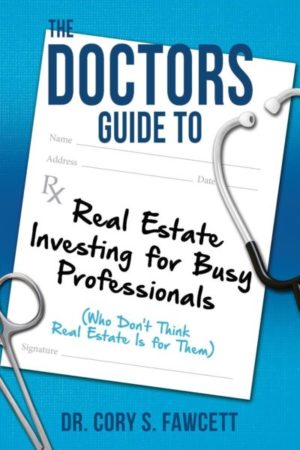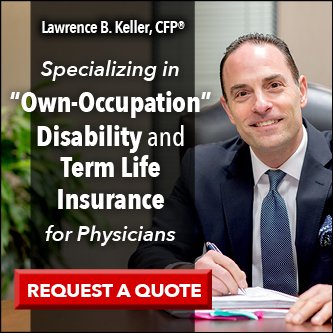After taking a little breather from writing books, I’m at it again. Book #4 in The Doctors Guide series will be coming out this fall, titled, The Doctors Guide to Real Estate Investing for Busy Professionals (Who Don’t Think Real Estate is For Them).
The book is currently in the hands of test readers and the final editing will be done this summer. Today I will give you a little teaser, here is the introduction to my real estate book. Be sure to sign up for my blog for updates on the release date.
Introduction
In 2001, eight years after leaving residency, my wife and I bought our first piece of investment property that was not related to my medical practice.
We already owned a portion of three medical office buildings with several other doctor partners. Each of these investments were formed by someone else and I was able to just hop on board. But this purchase was all ours, and it was the first of several. These properties put us on the path to a comfortable retirement, living off the cash flow from our real estate.
Over the next few years, we accumulated five small apartment complexes containing a total of 64 rental units. I was the manager and my wife was the bookkeeper. Together, we managed these apartments for 12 years while I was a full-time general surgeon in private practice and my wife was a stay-at-home mother to our two boys.
When other doctors discovered I had this small real estate empire, they were always astonished that I could manage it myself. I often got the question, “How could a full-time, busy surgeon possibly have the time to manage that much property?” This book is my answer to that question.
It is not a difficult task, if done correctly. Most doctors have both the time and the ability to manage a real estate business on the side. They lack only a little guidance and the willingness to take the first step.
Most people are so afraid of the amount of time they mistakenly think it will take to manage a single rental unit that they would never venture into managing an apartment complex. In reality, managing 64 units doesn’t take anywhere near the time and effort they perceive it takes.
I’ve often thought about the mistaken perceptions people have toward owning rental real estate. When someone hears that I own rental real estate properties they will tell me that they wouldn’t like to own a rental because they don’t want to have to unclog a toilet on Thanksgiving. You would be surprised how often it is the toilet that causes the problem and the holiday is Thanksgiving.
My thoughts are usually something like, “If they only knew how much money I was making, they would be happy to fix an occasional toilet.” In reality, emergencies like that are rare.
A few years after we started in real estate, I noticed that we made more money in real estate that year, working about 10-15 hours a month, than I made as a full-time general surgeon. And the call nights were a lot quieter.
Today I still have four of those original five apartment complexes, totaling 55 units. These properties produce sufficient cash flow to cover our living expenses during our retirement years with an income that continues to raise with inflation every year. We have created significant income for some of our family members as well. Our lifestyle has changed and we are now traveling more than 50% of the year. We no longer manage our real estate (it would be difficult from a cruise ship off the coast of Brazil or from our motorhome on Route 66).
It is ironic that while I was working full time, I had the time to manage our properties. But now that I am retired/repurposed, I am not home enough to manage the properties effectively. Most people assume that when they retire from their jobs, they will have the time to become the property manager. For me, the opposite was true.
Our other investments include a 401(k) from my practice, traditional IRAs for both my wife and me, a health savings account, a 403(b) account from my residency years, and a partnership in two medical buildings. We are not yet old enough for social security benefits or Medicare.
The wealth we accumulated from real estate has eclipsed all of our retirement savings during my 23 years in surgery. And that included living through one of the biggest real estate busts in history, starting in the late 2000s. My real estate cash flow and appreciation has been taxed very little, as is the nature of wealth generated by real estate. Most would say we live a very comfortable lifestyle.
I was always an entrepreneur, even as a teenager. Now I am a repurposed general surgeon who has morphed into an author, speaker, and financial coach for doctors and other high-income professionals. This book is the next step in my journey to pass on the knowledge I’ve obtained over the years so you won’t have to figure it all out yourself.
Come with me on this journey and you will be able to start your own real estate empire with confidence. Don’t listen to the naysayers. Don’t listen to people who don’t own any rental real estate. And please don’t take any advice from a reluctant landlord who got stuck with a house she couldn’t sell and decided to rent it out for a while. They rarely have a good go of it and they don’t have the knowledge to become a successful real estate investor.
If you will follow the advice I give you in the following pages, you will have the necessary tools to become a successful real estate investor. My grandparents did it with little education and a job that produced little income. Grandpa worked in a plywood mill while Grandma stayed home with the kids. Neither graduated from high school. I did it with a lot of education and a job that produced a high income and required a lot of my time. With a little guidance, you can do it too. There is no reason you cannot follow in the footsteps of those who have done it before you.
Regardless of your current income level or what the current real estate market looks like, it’s always the right time to buy a good piece of real estate and yes, even a busy professional can become a successful real estate investor.
“Now, one thing I tell everyone is learn about real estate. Repeat after me: real estate provides the highest returns, the greatest values and the least risk.”
—Armstrong Williams
Be sure you sign up for my blog so you will know exactly when The Doctors Guide to Real Estate Investing for Busy Professionals (Who Don’t Think Real Estate is For Them) is released.






Thank you Cory for the book. I really enjoyed it and your journey in real estate investment. I am a little unsure about the part where you say ‘buy for + cashflow’. Let me explain: I bought a condo for 163k, put 25% down, got a 25 yr loan that requires a monthly payment of 650$. Of the 1600$/month rent that I get, 650 goes to mortgage, 350 to HOA (to include heat in cold Vermont), 350 to taxes, 100 to property manager. So while I am still about 150 + cashflow, the cap rate turns out to be 5.8% which makes me wonder if I could have avoided all the hassle and time just by parking those $ into an index fund that on average would get me 6%. Am I missing something? Thank you for your time.
Varun,
Thank you for your comment. Yes you are missing something. I talk about using the positive cash flow as the break point for your decision to buy. (You really do not want to have a negative cash flow to feed from your pocket). But that does not represent the benefit you get from the investment.
In your case, for example, you are getting $150 a month cash flow or $1,800 a year. As rents raise with time, this figure will increase. That is about a 4.2% initial cash return on your down payment.
You are also getting the benefit of the principle paid on the loan every month. This is paid by the tenant with their rent check. In the first year, that will be about $2,660. As the loan gets paid down a little more every year, this figure will increase every year.
You also are getting appreciation of the property. If you count that as an average of 3% a year, then that comes to $4,890 the first year.
Then there is depreciation which is figured over 27.5 years. So you have a tax write off of $5,927 a year to use against the profits from this investment. Since only the rent pay down and the cash flow are taxable, your initial write off is larger than the income so you will owe no taxes.
That adds up to $9,350 in benefit the first year and that will climb with time.
Since your down payment was $40,750, that gives you a tax free return of about 23% the first year. That return will climb with time.
I would take that over investing in the stock market any day.
I am a newbie real estate investor and I am currently learning all that I can about the business. I started looking into this some years ago but I hesitated because I allowed my fear of the unknown get in the way of me jumping in. I started out working in the medical field and at one point considered becoming a doctor. I just turned 40 and this time I am going in. I am NOT even going to allow not having tons of money to invest to stop me from doing it. I am surrounded by so many resources and now that Dr. Fawcett has this book coming out, I am even more excited!! Thank you Dr. Cory because many people speak so low of real estate but I think it’s an amazing thing. My oldest daughter is now a Pre-Med student herself now and she wants to be a Neurosurgeon. Now that I am armed with the information that I have, I am preparing the way for my kids to learn and understand these concepts while they are young. Looking forward to getting your book Dr. Cory!!!
Thank you!!
Sasha, I think fear of the unknown holds us back from many great things in our life. Best of luck to you as you get started.
Will those of us who invest exclusively in passive commercial real estate and have NO interest in being a landlord/active real estate investor still get a lot of value out of your book Cory? Please be specific, thanks…
That depends. If you have decided to not invest in “active” real estate because you think it will take up too much of your time, or you think you don’t know enough to do that, this book will show you that this is a miss-perception. You can invest in “active” real estate and not have to be a “landlord.” This book is not about how to buy REITs or get involved in Syndications. My book will explain how to actually own true real estate investments in your portfolio without encroaching on your profession. I own 55 rental units and probably put as much time into that investment as those who own syndications put into their investments. Earlier this year I spent two months in Europe with my phone on airplane mode, yet I own “active” real estate investments (doesn’t that sound “passive”?). If you truly have no interest in owning investment real estate, for reasons other than time or knowledge, then you will not likely benefit from buying this book. But please don’t get the terms “active” and “passive” confused, as in thinking that owning real buildings is “active” and owning shares in syndications is “passive.” There are both active and passive components to both actual real estate ownership and owning shares in someone else’s real estate empire. This book is for those people who do want to own real estate investments, but were not sure if they could do it. They can do it, and I show them how.
Excited for this!
Glad you are excited. So many people have asked me to tell about how a busy surgeon could manage 64 rental units. The wait is almost over. Spread the word.